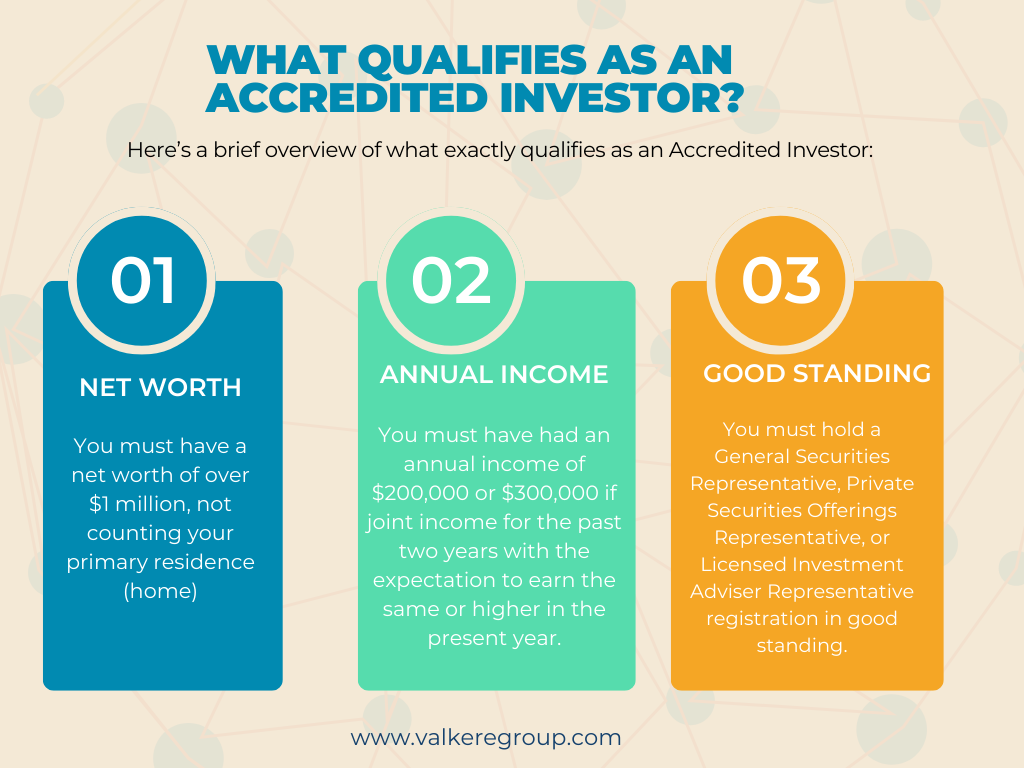All Categories
Featured
Table of Contents
A private should have a total assets over $1 million, leaving out the primary house (independently or with spouse or partner), to qualify as a recognized financier. Demonstrating adequate education or task experience, being a signed up broker or investment consultant, or having certain expert qualifications can also certify a private as an approved capitalist.
Approved investors have accessibility to investments not signed up with the SEC and can include a "spousal matching" when figuring out qualification. Approved financiers may encounter prospective losses from riskier investments and should confirm economic elegance to participate in unregulated investments (accredited vs qualified investor). Accredited capitalist standing matters since it figures out eligibility for financial investment chances not offered to the public, such as personal placements, endeavor funding, hedge funds, and angel investments
Non-accredited Investor

To get involved, certified financiers must come close to the provider of non listed protections, that may need them to complete a survey and supply monetary papers, such as income tax return, W-2 kinds, and account statements, to verify their status. Laws for recognized capitalists are overseen by the united state Securities and Exchange Compensation (SEC), guaranteeing that they meet specific monetary and specialist requirements.
This expansion of the recognized investor pool is meant to keep capitalist protection while giving higher access to non listed investments for those with the necessary financial class and threat resistance. - verify series 7 license
Definition Accredited Investor
Realty submission is rather similar to REITs due to the fact that it additionally entails merging resources to buy property financial investments. A submission bargain is when numerous investors merge their sources with each other to acquire a single realty property. This offer is created by a syndicator, additionally known as the general sponsor.
These investors will certainly give many of the resources needed to obtain the building. The distinction with REITs is that you can pick what syndication bargains to get involved in. If you count on the realty residential or commercial property being syndicated, you can sign up with as one of the easy investors. Property submission can be made with any sort of property, yet multifamily submission is the most popular kind since multifamily buildings often create a great deal of consistent earnings.
Additionally, these huge properties are normally tougher to get as a single investor, which is why syndication is a perfect arrangement. Financiers can take part in multifamily actual estate spending with a much reduced minimal investment.
Approved investors do not have to gather rental income, handle renters, take care of emergency situations, spend cash on repair work, and so on. Either the syndicator will certainly work with a third party residential or commercial property manager to do this or they will certainly manage it themselves - marketing to accredited investors. Each party in the multifamily submission financial investment owns a portion of the residential or commercial property.
Occasionally the syndicator has a larger percentage of the equity. The cash money circulation is generally split among the participants. This indicates investors obtain easy income from leas, and the eventual building sales. This is based on what percent of the building they possess, depending on the offer structure.
Cpa Letter Accredited Investor

Our opinions are our very own. A recognized capitalist is a person or establishment that can spend in unregulated safety and securities.
Non listed protections are inherently dangerous however commonly supply higher prices of return. If you have actually ever before encountered a financial investment offered just to supposed recognized capitalists, you've likely wondered what the term suggested. The label can relate to entities ranging from substantial banking institutions and affluent Fortune 500 firms, all the means to high-earning families and also individuals.
Offering to recognized investors is just among those exceptions, covered by SEC Regulation 501 under Guideline D of the Stocks Act of 1933. The guideline was prepared as a government action to the Great Clinical depression, providing market accessibility to smaller firms that might otherwise be crushed under the prices going along with SEC enrollment.
Capitalists without certification can handle the full breadth of registered safeties like supplies, bonds, and common funds. They can additionally build up riches, purchase realty, build retirement portfolios, take dangers, and gain rewards the greatest difference is in the range of these endeavors. One of the benefits of being a certified financier is that once you obtain this standing, it "unlocks" accessibility to items not offered to the public, such as hedge funds, equity capital funds, exclusive equity funds, and angel investing.
As an example, the SEC thinks about hedge funds a more "versatile" financial investment technique than something like shared funds, due to the fact that hedge funds make use of speculative practices like leverage and short marketing. Given that these complex products need added research study and understanding, financiers need to show that they understand the risks associated with these kinds of investments before the SEC is comfortable with them diving in
While several are mostly familiar with the SEC's consumer protection efforts, the regulatory authority's commitments are really twofold. To make certain that those two initiatives aren't in dispute, it's often needed for the SEC to match up high-risk, high-reward opportunities with ideal capitalists.
Accredited Investor Pre Ipo
One aids browse the unregulated market, and the other will float you to safety should the waves endanger. The typical investor is risk-free on the coastline or paddling in the shallows, risk-free under the careful look of the lifeguard (i.e., the SEC). Safety and securities that are available to certified financiers are provided with private offerings, which may include fewer guidelines than safeties supplied to even more regular investors.
By Percent - January 11, 2021 When it concerns purchasing stocks and bonds, basically anybody can spend. As long as you more than the age of 18 (or 21, in some states), not trading on details, or not investing as component of a conflict of interest, you can be a component of public markets whether you have $1 or $1 million.
Specific financial investment vehicles including those on Percent are only readily available to a class of financiers legally specified as These capitalists have the explicit consent from regulatory bodies based on a slim set of standards to spend in certain kinds of financial investments secretive markets. Yet that can be an accredited financier? Even better, why are accredited investors a thing in the initial area? After the Great Depression, the U.S

This act required capitalists to have a far better understanding of what they were spending in, while restricting misstatements, scams, and deceit in safety and security sales. Congress presumed this law would secure the "normal" capitalist. Personal offerings those beyond the general public stock market were exempt from securities legislations, which produced some concerns.
The Securities and Exchange Payment (SEC) eventually took on policy 501 of Law D, which defined who can invest in private offerings and specified the term "recognized investor" a term that was later on updated in 2020. A certified financier is any person who fulfills any one of the complying with requirements: Investors with gained revenue that went beyond $200,000 (or $300,000 along with a spouse) in each of the prior 2 years, and expects to fulfill the very same benchmarks in the current year.
Those who are "knowledgeable workers" of an exclusive fund. SEC- and state-registered investment advisers (however not reporting experts) of these entities can likewise now be taken into consideration recognized investors.
Accredited Investor Requirements

If you have a web worth of over $1 million (not including your primary property/residence), made $200,000+ a year for the last 2 years, or have your Series 7 certificate, you can make investments as an approved investments. There are many other qualifications (as you can find over), and the SEC plans on adding extra in the close to future.
Since the very early 1930s, federal government regulatory authorities have actually located it difficult to safeguard capitalists secretive offerings and safety and securities while simultaneously maintaining the growth of startups and various other young business - business that several think are in charge of most of job growth in the USA - private placement non accredited investor. Stabilizing this task had actually been forefront of the mind of the Securities and Exchange Commission ("SEC") for many years
Latest Posts
Local Tax Delinquent Property List
Buy Houses That Owe Taxes
Tax Sale Unclaimed Funds